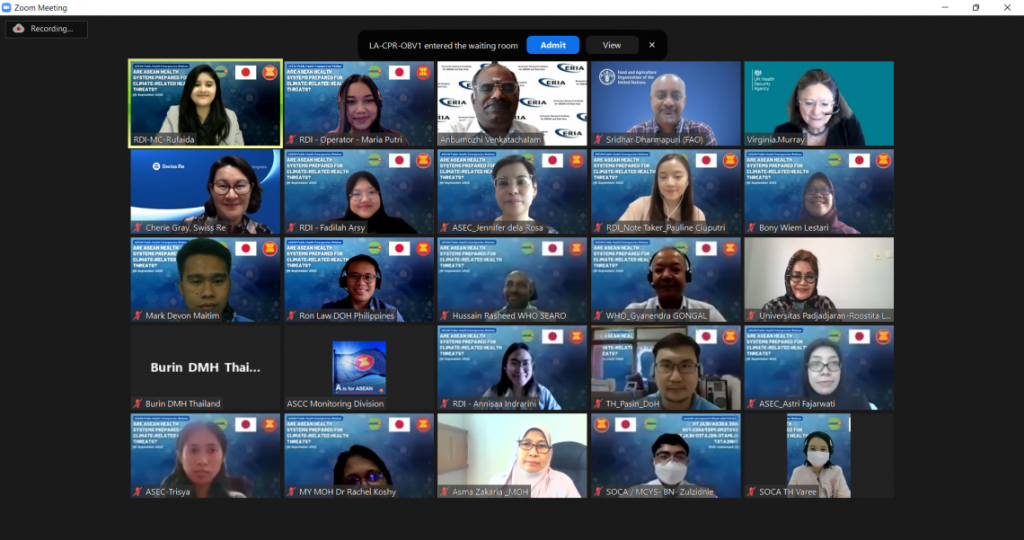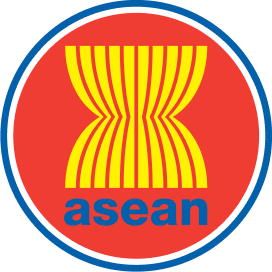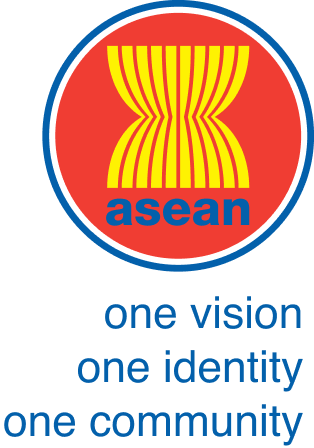



 JAKARTA, 6 September 2022 – The “Are ASEAN Health Systems Prepared for Climate-Related Health Threats?” webinar called for accelerated multisectoral actions to address priority health issues and strengthen health systems to tackle climate-induced emergencies.
JAKARTA, 6 September 2022 – The “Are ASEAN Health Systems Prepared for Climate-Related Health Threats?” webinar called for accelerated multisectoral actions to address priority health issues and strengthen health systems to tackle climate-induced emergencies.
The webinar is part of the Public Health Emergencies webinar series under the ASEAN Socio-Cultural Community (ASCC) Research and Development Platform Programme supported by the Japan-ASEAN Integration Fund. Strengthening foresight on trends and challenges of climate change on regional health security was the focus of the first session.
In his opening remarks, Deputy Secretary-General of ASEAN for ASCC, Ekkaphab Phanthavong, highlighted that vulnerable and marginalised population in ASEAN will increasingly be hit hardest by the effects of climate change. He encouraged regional health systems to enhance social welfare, reduce inequalities, and contribute to sustainable development.
Sum Cheat from the Cambodian Ministry of Environment provided an overview of climate change impacts since the turn of the century, and outlined the achievements of frameworks such as the Sendai Framework for Disaster Risk Reduction 2015 – 2030 and the World Health Organisation (WHO) Health Emergency and Disaster Risk Management. He encouraged impactful regional strategies to adapt and respond to the intensified health impacts of climate change.
Resilient supply chains supported by international support and regional agreement can be cost effective in enhancing a climate change resilient health system, according to Dr. Rasheed Hussain of WHO SEARO.
Sridhar Dharmapuri from the Food and Agriculture Organization of the United Nations Regional Office for Asia and the Pacific emphasised that climate solutions are not single sector solutions. “We need more science and evidence to implement solutions on these issues, thus we need holistic solutions involving different sectors to work together,” he said.
International and regional collaboration, long term disaster risk insurance, and robust climate data collection and analysis were among other critical actions to be taken, according to Dr. Anbumozhi Venkatachalam (Director of Research Strategy and Innovation ERIA), Cherie Gray (Swiss Re) and Professor Virginia Murray (UK Health Security Agency).
Strategies to establish a sustainable and climate resilient health system as a response to climate change threats was the focus of the second session of the webinar. Integrating mental health into primary and secondary healthcare will be an important step forward, according to Dr Burin Suraaroonsamrit from the Ministry of Public Health Thailand.
In dealing with climate change induced non-communicable diseases, Dr. Thahilrahtul Asma’ Zakaria from the Ministry of Health Malaysia said that “Health services need to implement a sustainable approach to emission in the health sector and ensure uninterrupted access to care and treatment of NCD patients”. A one health approach is needed for climate change and infectious disease management.
In addition, Prof Emily Ying Yang Chan, Chinese University of Hong Kong, mentioned that new technology development can contribute to community health systems but socio-cultural barriers to their use must be addressed.
Food safety risk assessments in emergency, multi-sector collaboration, and community engagement in ASEAN’s future strategies were of urgency, according to Prof. drh. Roostita L. Balia (Universitas Padjajaran, Indonesia), Dr Narumol Sawanpanyalert (Ministry of Public Health Thailand), Dr Gyanendra Gongal (WHO SEARO, India), Cherie Tan (Asia Pacific Bayer Crop Science, Singapore), and Dr Ronald Law (Department of Health, the Philippines).
Actions to enhance health resilience in the region was the subject of the discussion sessions. Repurposing existing COVID-19 infrastructure and programmes to support next-generation resilient health systems were some low-hanging fruits that ASEAN should consider. Disaster awareness and literacy should also be strengthened. The discussions also highlighted political will is crucial to ensure that plans progress into legislation and financial support.
Dr. Bony Wiem Lestari from Resilience Development Initiative Indonesia, highlighted ASEAN initiatives to achieve a resilient and sustainable health system in ASEAN. She said that addressing the capacity gap, limited resources, and diverse conditions in ASEAN requires collaborative regional actions and harmonisation of efforts to fulfil the Paris Agreement and ensure the health system’s capacity to ensure no one is left behind.








